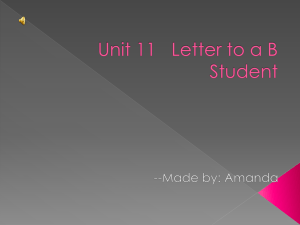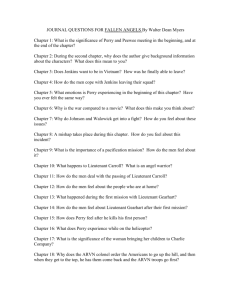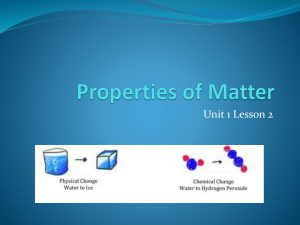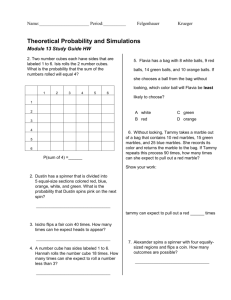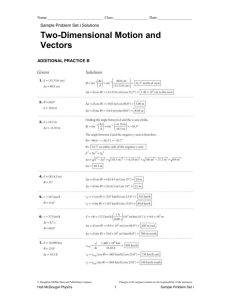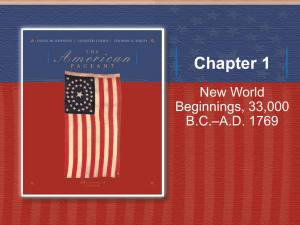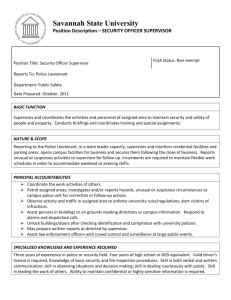Unit 4
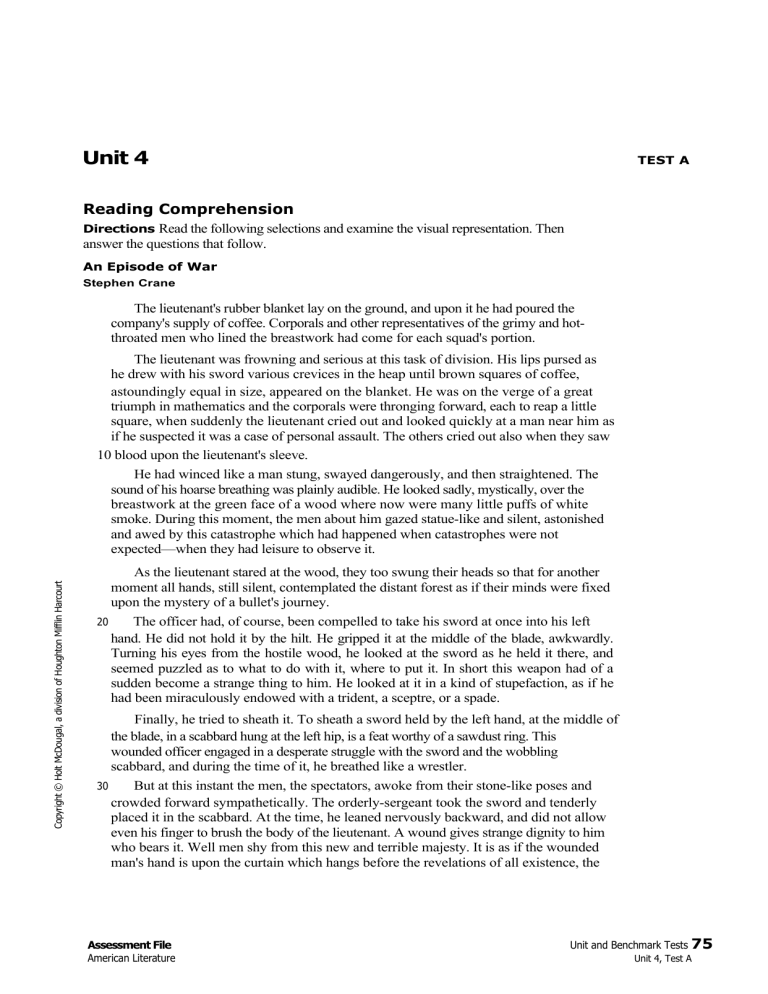
Unit 4
Reading Comprehension
Directions Read the following selections and examine the visual representation. Then answer the questions that follow.
An Episode of War
Stephen Crane
The lieutenant's rubber blanket lay on the ground, and upon it he had poured the company's supply of coffee. Corporals and other representatives of the grimy and hotthroated men who lined the breastwork had come for each squad's portion.
The lieutenant was frowning and serious at this task of division. His lips pursed as he drew with his sword various crevices in the heap until brown squares of coffee, astoundingly equal in size, appeared on the blanket. He was on the verge of a great triumph in mathematics and the corporals were thronging forward, each to reap a little square, when suddenly the lieutenant cried out and looked quickly at a man near him as if he suspected it was a case of personal assault. The others cried out also when they saw
10 blood upon the lieutenant's sleeve.
He had winced like a man stung, swayed dangerously, and then straightened. The sound of his hoarse breathing was plainly audible. He looked sadly, mystically, over the breastwork at the green face of a wood where now were many little puffs of white smoke. During this moment, the men about him gazed statue-like and silent, astonished and awed by this catastrophe which had happened when catastrophes were not expected—when they had leisure to observe it.
As the lieutenant stared at the wood, they too swung their heads so that for another moment all hands, still silent, contemplated the distant forest as if their minds were fixed upon the mystery of a bullet's journey.
20 The officer had, of course, been compelled to take his sword at once into his left hand. He did not hold it by the hilt. He gripped it at the middle of the blade, awkwardly.
Turning his eyes from the hostile wood, he looked at the sword as he held it there, and seemed puzzled as to what to do with it, where to put it. In short this weapon had of a sudden become a strange thing to him. He looked at it in a kind of stupefaction, as if he had been miraculously endowed with a trident, a sceptre, or a spade.
30
Finally, he tried to sheath it. To sheath a sword held by the left hand, at the middle of the blade, in a scabbard hung at the left hip, is a feat worthy of a sawdust ring. This wounded officer engaged in a desperate struggle with the sword and the wobbling scabbard, and during the time of it, he breathed like a wrestler.
But at this instant the men, the spectators, awoke from their stone-like poses and crowded forward sympathetically. The orderly-sergeant took the sword and tenderly placed it in the scabbard. At the time, he leaned nervously backward, and did not allow even his finger to brush the body of the lieutenant. A wound gives strange dignity to him who bears it. Well men shy from this new and terrible majesty. It is as if the wounded man's hand is upon the curtain which hangs before the revelations of all existence, the
TEST A
Assessment File
American Literature
Unit and Benchmark Tests
75
Unit 4, Test A
UNIT 4, TEST A CONTINUED meaning of ants, potentates, wars, cities, sunshine, snow, a feather dropped from a bird's wing, and the power of it sheds radiance upon a bloody form, and makes the other men understand sometimes that they are little. His comrades look at him with large eyes thoughtfully. Moreover, they fear vaguely that the weight of a finger upon him might
40 send him headlong, precipitate the tragedy, hurl him at once into the dim grey unknown.
And so the orderly-sergeant while sheathing the sword leaned nervously backward.
There were others who proffered assistance. One timidly presented his shoulder and asked the lieutenant if he cared to lean upon it, but the latter waved them away mournfully. He wore the look of one who knows he is the victim of a terrible disease and understands his helplessness. He again stared over the breastwork at the forest, and then turning went slowly rearward. He held his right wrist tenderly in his left hand, as if the wounded arm was made of very brittle glass.
And the men in silence stared at the wood, then at the departing lieutenant—then at the wood, then at the lieutenant.
50 As the wounded officer passed from the line of battle, he was enabled to see many things which as a participant in the fight were unknown to him. He saw a general on a black horse gazing over the lines of blue infantry at the green woods which veiled his problems. An aide galloped furiously, dragged his horse suddenly to a halt, saluted, and presented a paper. It was, for a wonder, precisely like an historical painting.
To the rear of the general and his staff, a group, composed of a bugler, two or three orderlies, and the bearer of the corps standard, all upon maniacal horses, were working like slaves to hold their ground, preserve their respectful interval, while the shells bloomed in the air about them, and caused their chargers to make furious quivering leaps.
60 A battery, a tumultuous and shining mass, was swirling toward the right. The wild thud of hoofs, the cries of the riders shouting blame and praise, menace and encouragement, and, last, the roar of the wheels, the slant of the glistening guns, brought the lieutenant to an intent pause. The battery swept in curves that stirred the heart; it made halts as dramatic as the crash of a wave on the rocks, and when it fled onward, this aggregation of wheels, levers, motors, had a beautiful unity, as if it were a missile.
The sound of it was a war-chorus that reached into the depths of man's emotion.
70
The lieutenant, still holding his arm as if it were of glass, stood watching this battery until all detail of it was lost, save the figures of the riders, which rose and fell and waved lashes over the black mass.
Later he turned his eyes toward the battle where the shooting sometimes crackled like bush-fires, sometimes sputtered with exasperating irregularity, and sometimes reverberated like the thunder. He saw the smoke rolling upward and saw crowds of men who ran and cheered, or stood and blazed away at the inscrutable distance.
He came upon some stragglers and they told him how to find the field hospital.
They described its exact location. In fact these men, no longer having part in the battle,
76 Unit and Benchmark Tests
Unit 4, Test A
Assessment File
American Literature
UNIT 4, TEST A CONTINUED knew more of it than others. They told the performance of every corps, every division, the opinion of every general. The lieutenant, carrying his wounded arm rearward, looked upon them with wonder.
At the roadside a brigade was making coffee and buzzing with talk like a girls'
80 boarding-school. Several officers came out to him and inquired concerning things of which he knew nothing. One, seeing his arm, began to scold. "Why, man, that's no way to do. You want to fix that thing." He appropriated the lieutenant and the lieutenant's wound. He cut the sleeve and laid bare the arm, every nerve of which softly fluttered under his touch. He bound his handkerchief over the wound, scolding away in the meantime. His tone allowed one to think that he was in the habit of being wounded every day. The lieutenant hung his head, feeling, in this presence, that he did not know how to be correctly wounded.
The low white tents of the hospital were grouped around an old school-house.
There was here a singular commotion. In the foreground two ambulances interlocked
90 wheels in the deep mud. The drivers were tossing the blame of it back and forth, gesticulating and berating, while from the ambulances, both crammed with wounded, there came an occasional groan. An interminable crowd of bandaged men were coming and going. Great numbers sat under the trees nursing heads or arms or legs. There was a dispute of some kind raging on the steps of the school-house. Sitting with his back against a tree a man with a face as grey as a new army blanket was serenely smoking a corn-cob pipe. The lieutenant wished to rush forward and inform him that he was dying.
A busy surgeon was passing near the lieutenant. "Good morning," he said with a friendly smile. Then he caught sight of the lieutenant's arm and his face at once changed.
"Well, let's have a look at it." He seemed possessed suddenly of a great contempt for the
100 lieutenant. This wound evidently placed the latter on a very low social plane. The doctor cried out impatiently. What mutton-head had tied it up that way anyhow. The lieutenant answered: "Oh, a man."
When the wound was disclosed the doctor fingered it disdainfully. "Humph;' he said. "You come along with me and I'll 'tend to you." His voice contained the same scorn as if he were saying: "You will have to go to jail."
The lieutenant had been very meek but now his face flushed, and he looked into the doctor's eyes. "I guess I won't have it amputated," he said.
"Nonsense, man! nonsense! nonsense!" cried the doctor. "Come along, now I won't amputate it. Come along. Don't be a baby."
110 "Let go of me," said the lieutenant, holding back wrathfully. His glance fixed upon the door of the old school-house, as sinister to him as the portals of death.
And this is the story of how the lieutenant lost his arm. When he reached home his sisters, his mother, his wife, sobbed for a long time at the sight of the flat sleeve. "Oh, well," he said, standing shamefaced amid these tears, "I don't suppose it matters so much as all that."
Assessment File
American Literature
Unit and Benchmark Tests 77
Unit 4, Test A
UNIT 4, TEST A CONTINUED from Company Aytch
Sam R. Watkins
And while my imagination is like the weaver's shuttle, playing backward and forward through these two decades of time, I ask myself, Are these things real? did they happen? are they being enacted today? or are they the fancies of the imagination in forgetful reverie? . . . Surely they are but the vagaries of mine own imagination. Surely my fancies are running wild to-night. But hush! I now hear the approach of battle. That low, rumbling sound in the West is the roar of cannon in the distance. That rushing sound is the tread of soldiers. That quick, lurid glare is the flash that precedes the cannon's roar.
And listen! that loud report that makes the earth tremble and jar and sway, is but the bursting of a shell, as it screams through the dark, tempestuous night. That black, ebon
10 cloud, where the lurid lightning flickers and flares, that is rolling through the heavens, is the smoke of battle; beneath is being enacted a carnage of blood and death. Listen! the soldiers are charging now. The flashes and roaring now are blended with the shouts of soldiers and the confusion of battle.
© Jonathan Ernst / Reuters / Corbis
A portion of Arlington
National Cemetery in
Virginia
78 Unit and Benchmark Tests
Unit 4, Test A
Assessment File
American Literature
UNIT 4, TEST A CONTINUED
COMPREHENSION
Directions Answer the following questions about the story "An Episode of War."
1. What is the social context of the story?
A. the Civil War
4. Based on the details in lines 20-25, you can best make the inference that the lieutenant is
B . post-war Reconstruction
C.
the westward expansion
D.
increasing urbanization
A. extremely happy
B . in a dream
C.
extremely funny
D.
in shock
2. Lines 1-3 reflect the naturalist approach of
A. including insignificant details
B . featuring unique characters
C.
depicting ordinary people
D.
focusing on nature
3. The word assault comes from the Latin word assalire, which means "to jump on." What is the most likely meaning of assault as it is used in line 9?
A. surprise C. attack
B . response D. identity 5. The repetition of the phrase "leaned nervously backward" suggests a tone that is
A. reverent
B thoughtful
C. modest
D. anxious
.
6. Which lines best reflect the naturalist theme of the insignificance of the individual?
A. "A wound gives strange dignity to him who bears it." (lines 33-34)
B . "The power of it sheds radiance upon a bloody form" (line 37)
C.
"men understand sometimes that they are little" (line 38)
D.
"hurl him at once into the dim, grey unknown" (line 40)
Assessment File
American Literature
Unit and Benchmark Tests
Unit 4, Test A
79
UNIT 4, TEST A CONTINUED
7. The word spectators comes from the Latin word spectare, which means "to watch." What is the most likely meaning of spectators as it is used in line 30?
A. reactions
B . invitations
C. followers
D. observers
8. What connotation does the word dragged have in line 53?
A. forceful
B . uncertain
C. skillful
D. nervous
9. The setting in lines 55-59 forces the characters to
A. behave quietly
B . fight their friends
C.
run for retreat
D.
act quickly and strongly
10. Lines 60-66 present a social context that shows the
A. precise organization of the troops
B . necessity of fighting for a cause
C.
grim, chaotic reality of war
D.
need to save the natural landscape
11. Lines 88-96 reinforce the story's social context by showing how
A. war was terrible
B . schools were abandoned
C.
roadways were primitive
D.
medicine was important
12. What connotation does the word groan have in line 92?
A. painful
B . determined
C. triumphant
D. sarcastic
13. The description of the hospital in lines 88-96 suggests a setting that is
A. dirty
B . professional
C.
D. harmless chaotic
80 Unit and Benchmark Tests
Unit 4, Test A
Assessment File
American Literature
UNIT 4, TEST A CONTINUED
14. Which incident shows the naturalists' use of irony?
A. the lieutenant dividing coffee among his corporals
B . the ambulance drivers causing suffering instead of helping soldiers
C.
the soldiers standing around helplessly after the lieutenant is shot
D.
the lieutenant telling the doctor he didn't want his arm amputated
15. Which tone is created by words such as maniacal, furious, and quivering in lines 55-59?
A. sympathetic
B . weary
C.
frightening
D.
sorrowful
16. The surgeon's rough manner helps you infer that the surgeon is
A. friendly only to other doctors
B . used to seeing many wounded men
C.
lacking medical training
D.
unsure how he will help the lieutenant
17. Which tone is conveyed by the sentence "And this is the story of how the lieutenant lost his arm"?
A. distracted
B . compassionate
C. uplifting
D. unemotional
18. An example of an external conflict in the story is the
A. lieutenant rationing coffee
B . soldiers crowding around the lieutenant
C.
lieutenant's feelings about his injury
D.
doctor insisting on treating the lieutenant
20. Which statement conveys the naturalist theme that the individual lacks control over events and feelings?
A. "Listen! the soldiers are charging now."
B . "That quick, lurid glare is the flash that precedes the cannon's roar."
COMPREHENSION
Directions Answer the following questions about the excerpt from Company Aytch.
19. The speaker's questions help you infer that, today, he finds his war experiences
A.
B . haunting hazy
C. simple
D. fatal
C.
D.
"Surely my fancies are running wild tonight."
"That rushing sound is the tread of soldiers."
Assessment File
American Literature
Unit and Benchmark Tests
Unit 4, Test A
81
UNIT 4, TEST A CONTINUED
21. The word vagary comes from the Latin word vagari, which means "to wander." What is the most likely meaning of vagaries as it is used in line 4?
A. outings
B . solid details
C. decisions
D. odd ideas
22. After the speaker says, "But hush! I now hear the approach of battle," the speaker's interpretation of the environment reflects the naturalist attitude that people act
A. with powerful concern for the welfare of others
B . on instinct rather than by choice
C.
in ways that will save them from suffering
D.
through logical free will
23. Which internal conflict does the speaker experience?
A. His reminiscences about the war exclude his wife and children.
B . Nothing protects him from the cannons that continually go off nearby.
C.
He still experiences the sensations of a battle that happened twenty years ago.
D.
He regrets that he is no longer a soldier carrying out heroic rescues.
24. The repetition of the word battle helps create a tone that is
A. bullying
B . unsettled
C. appreciative
D. noble
COM PREHENSION
Directions Answer the following questions about the short story "An Episode of War" and the excerpt from Company Aytch.
25. From the behavior of the lieutenant in the short story and the "fancies" of the speaker in Company Aytch, you can best infer that these soldiers became
D.
wise as they overcame obstacles
A. defiant in the face of the enemy
B safety
. disoriented by threats to their
C.
unable to recall physical details
26. The fact that both writers choose words related to storms to describe battle creates a tone that is
A.
B lively respectful
C. intense
D. disgusted
.
82 Unit and Benchmark Tests
Unit 4, Test A
Assessment File
American Literature
UNIT 4, TEST A CONTINUED
COMPREHENSION
Directions Answer the following questions about the visual representation.
27. The rows and rows of graves create a visual impression of
28. The composition of this photograph suggests that the photographer wanted to emphasize the
A.
B.
texture focus
C. depth
D. light
A.
contrast between life and death
B.
vast numbers of soldiers who have died
C.
power of nature over people's wishes
D.
hopefulness of springtime
Written Response
SHORT RESPONSE
Directions Write two or three sentences to answer each question on a separate sheet of paper.
29.
How does the setting in lines 60-66 of "An Episode of War" reflect naturalist ideas?
Give one example to support your response.
30.
Identify the conflict that the men face in lines 30-41 of "An Episode of War." Is this conflict internal or external? Explain your response.
EXTENDED RESPONSE
Directions Write two or more paragraphs to answer this question on a separate sheet of paper.
31.
A common theme in naturalism is that human destiny is beyond the control of the individual. How is this theme reflected in the story and the excerpt from Company
Aytch? Provide three examples to support your answer.
Assessment File
American Literature
Unit and Benchmark Tests 83
Unit 4, Test A
UNIT 4, TEST A CONTINUED
Revising and Editing
Directions Read this excerpt from an analytical essay and answer the questions that follow.
(1) It was 1893. (2) The Gilded Age was about to end in an economic depression, but in Chicago, a big fair was being put on, the World's Columbian
Exposition. (3) Some popular writers took the fair for their subject. (4) At the same time, writers were already weaving social issues into their otherwise popular sentimental entertainments. (5) Lurking under the simple stories of the day were a cluster of social issues that will be recognized by anyone who is studying this period of U.S. history.
(6) For example, in 1892, the African-American writer Frances Harper published her novel Iola Leroy. (7) Today, people describe the book as a convoluted plot about crossing the color line and living an unsettled life. (8) At the time, however, the book reflected the mood of many women in the country.
(9) Many wants the vote and many believes in education for women as a way forward. (10) This novel took those themes seriously.
(11) Then there was Clara Louise Burnham. (12) Her 1894 book Sweet
Clover: A Romance of the White City used the setting of the 1893 fair to say some things about marriage. (13) In this case, a teenager who had to support her sick, widowed mother and three siblings decides to marry an old rich man.
(14) You can see where this social issue is similar to others.
(15) Also there is Frances Hodgson Burnett, famous author of The Secret
Garden. (16) Burnett used the Columbian Exposition as a setting for her 1895 novel Two Little Pilgrims' Progress: A Story of the City Beautiful. (17) This book is about twin orphans who are not offered many opportunities by their tough old aunt's farm. (18) A review in The New York Times on October 19,
1895, said that the book was "free from any mere sentimentality," yet it also said that "Mrs. Burnett's command of pathos is extraordinary." (19) Pathos is a feeling of pity. (20) All three books mentioned so far played on people's feelings of pity.
(21) Finally, one more example is L. Frank Baum, whose most famous book is The Wonderful Wizard of Oz. (22) Baum's Emerald City may be modeled on the World's Columbian Exposition, often called "the White City" because of the color of its buildings. (23) Baum's mother-in-law was a famous activist for women's voting rights. (24) In many of his works and in his life as well,
Baum promoted women's rights through entertaining.
84
Unit and Benchmark Tests
Unit 4, Test A
Assessment File
American Literature
UNIT 4, TEST A CONTINUED
1. Changing the verbs in sentences 1 and 2 to present tense would make the introduction
A. passive
B . more immediate
C. less choppy
D. informal
2. Which statement summarizes the thesis of this essay?
A. The 1893 Columbian Exposition produced numerous popular writers.
B . People who know about the themes of the
1890s will recognize them in literature of the era.
C.
Some popular writers of the 1890s addressed social issues through their stories.
D.
Without the Columbian Exposition, many social issues would not have come to light.
3. Which two sentences should the writer combine into a clear thesis statement?
A. sentences 2 and 3
B . sentences 3 and 4
C.
sentences 3 and 5
D.
sentences 4 and 5
4. Which revision of sentence 5 corrects an error in subject-verb agreement?
A. change Lurking to Lurked
B . change were to was
C.
change will be to would be
D.
change is studying to are studying
5. Which revision to the end of sentence 5 changes passive voice to active voice?
Assessment File
American Literature
A. will be recognized by students of
U.S. history
B . anyone studying this period of U.S. history will recognize
C.
would become recognized by anyone studying this period of
U.S. history
D.
U.S. history of this period could be recognized by
6. Which sentence contains gerund phrases?
A. sentence 7
B . sentence 9
C. sentence 13
D. sentence 16
7. Which sentence contains two errors in subject-verb agreement?
A. sentence 6
B . sentence 9
C. sentence 14
D. sentence 17
8. To use the present verb tense effectively in sentence 13, change
A. had to has
B . support to supports
C.
decides to decided
D.
marry to marries
Unit and Benchmark Tests
Unit 4, Test A
85
UNIT 4, TEST A CONTINUED
9. To improve the way sentence 10 gives evidence to support the thesis, the writer should
A. describe the themes in greater detail
B . change the word novel to writer
C.
connect the themes to the book's plot
D.
give statistics to support the claim
10. Which sentence contains passive voice?
A. sentence 17
B . sentence 18
C. sentence 19
D. sentence 20
11. To connect the paragraph about Frances
Hodgson Burnett to the thesis statement, the writer should
A. give background for readers unfamiliar with the book The Secret Garden
B . remove the references to pathos and sentimentality
C.
tell more about what happens to the twin orphans in "the City Beautiful"
D.
identify social issues covered in the book
Two Little Pilgrims' Progress
12. Which word from the last paragraph is a gerund?
A.
B . modeled activist
C. rights
D. entertaining
Writing
Directions Read the following quotation. Then read the prompt that follows and complete the writing activity.
"I find that principles have no real force except when one is well fed."
Mark Twain
Prompt: Write an analytical essay in which you discuss how an author or a work from this unit portrays the principles, or values, of people from a region of the United States. Include details that support your thesis statement.
Now write your essay. The following reminders will help you.
Reminders
Be sure your writing does what the prompt asks.
Clearly state a thesis about the author or the work.
Use transitions to link ideas.
Maintain an appropriate analytical tone.
Check for correct grammar, spelling, and punctuation.
86
Unit and Benchmark Tests
Unit 4, Test A
Assessment File
American Literature
